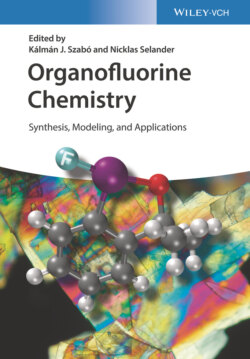Читать книгу Organofluorine Chemistry - Группа авторов - Страница 25
2.2.1.2 Reaction of Aromatic Compounds
ОглавлениеIn contrast to perfluoroalkylations of alkenes, the reaction of aromatic compounds with perfluorocarboxylic acids via electrolysis is less well studied. This is due to the occurrence of undesired acetoxylation via radical cation formation of the aromatic substrates in the electrooxidation, and thus Kolbe‐type electrolysis of the carboxylic acid fails in the usual cases (Scheme 2.14a). Exceptionally, in 1978, Grinberg et al. demonstrated the trifluoromethylation of monosubstituted benzenes possessing a trifluoromethyl or cyano group with trifluoroacetate in aqueous acetonitrile on a Pt electrode (Scheme 2.14b) [25a]. Acetonitrile, used as the solvent, was found to suppress oxidation of the substrate as well as the acetoxylation [25b]. Trevin and coworkers investigated the trifluoromethylation of several aromatic compounds possessing electron‐withdrawing groups with trifluoroacetic acid by means of preparative electrolysis using Pt electrodes in pure organic solvent [26]. Under the nonaqueous conditions, pyridine as a base forming the trifluoroacetate salt promoted the anodic trifluoromethylation.
Scheme 2.14 Aromatic trifluoromethylation: (a) problem in reaction development; (b) trifluoromethylation of electron‐deficient aromatic compounds.
